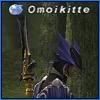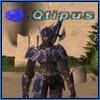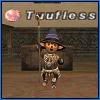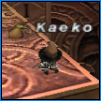Every Thursday Araelus is bringing the science to FFXI.
The Math of Sword and Spell will be a column dedicated not only to the hardcore calculations and statistics of FFXI, but more importantly he will help you use that math without confusing you. You may not know why you are playing better, but rest assured you will be playing better. This week Araelus starts off a new series of columns on multiplication.
Whether you're having difficulty picking members for your next mission run, wondering if the statistics of a pricey weapon are worth the cost, deliberating what job to level next, or just wondering if you should log in today - understanding the game mechanics of FFXI will shed light on recurring questions every player has.
This month, we'll be considering the jobs that can make any team stronger - even if some do so by making the enemy weaker. These people drastically increase the power of their fellows, from both the front and back lines of battle. Don't just throw more players at the problem: make everyone you have more effective.
Get some force multipliers.
This week: what can one player do to help everyone, no matter how many people are there? What spells and abilities affect the entire fight?
The key to universal force multiplication is the blurry distinction between enhancing and enfeebling. While many jobs can boost their teammates' statistics, and in almost every situation this will be occurring, when an enemy is weakened it immediately benefits everyone who interacts with that monster. So casting Dia can be thought of as a very powerful, battle-wide Warcry or Minuet, without preventing those actual buffs from being used.
There are three primary enfeebles which help everyone in the fight: lowering defense (Dia, Angon, Box Step); lowering evasion (Feint, Gravity, Quickstep); and changing magic effectiveness.
Lowering defense and evasion are straight-forward. Everyone dealing melee damage is more effective when the enemy is weaker. Spells which lower VIT or AGI have this effect indirectly.
Dealing with magic is more complex, depending on whether the target is immune to certain spells. The Threnody line of songs comes into play by reducing elemental resistance, and the BLM spell Burn reduces INT while causing slip damage. These do not strictly change magic evasion or defense, respectively, but the resulting effect is the same. Dancer's Stutter Step does directly reduce magic evasion, one of the few cases where that job can benefit everyone at once in a unique way.
Dispel, Finale, and Dark Shot can potentially cause a monster's defense, evasion, or magic resistance to be lowered, depending on what effect they remove. Don't forget these! Often a monster's abilities will overwrite enfeebles or otherwise invalidate what has been applied.
What about preventing enemy actions? Paralyze, Jubaku, Stun, Silence, the Bash line of abilities, Violent Flourish, even Bind, all prevent a monster from taking certain actions. While these are indispensable, they technically affect the monster's current target far more than the entire friendly team. If the loss of a tank will mean defeat, if hate is shaky, if the enemy is capable of casting -aga spells or hitting everyone with TP moves, though, then a well-timed Stun or serendipitous Paralyze can turn the tide.
The same is true for reducing attack speed (Slow, Elegy, Hojo), reducing accuracy (Blind, Kurayami, Flash), and reducing monster attack or magic damage. All are useful elements of force multiplication, but will be discussed at a later time, and depend heavily on who the enemy is targeting.
In terms of raw effectiveness, the more people who are fighting a particular enemy, the more benefit gained from enfeebling that enemy. In Dynamis, one Dia spell benefits entire alliances of melees. A target rich environment means hitting more monsters with a single cast, especially for Scholars.
On the other extreme, in a low-man situation where every spot counts, not being able to target alliance members with Refresh or Madrigal isn't as much of an issue. And even in the biggest events, every party has some support. Added to battle-wide effects through enfeebling, there are some great localized buffs available. Next week, we'll take a look at single-party force multipliers.
Until then, keep your graphing calculators handy!
This week's...
Most Valuable: Dia III. It can only be resisted with Magic Immunity. Stacks with Angon.
Ignored Ability: Corsairs can increase the power of enfeebles by using the proper Quick Draw.
Hazard Symbol: Stacking single-target debuffs on multiple mobs at once with Scholar's Manifestation can lead to enmity issues. Be careful, and get support from melees.
Overworked and Underpaid Job: Blue Mages have the ability to inflict many enfeebles, using spells including Frightful Roar, Infrasonics, Light of Penance, Sandspin, Corrosive Ooze, or Geist Wall.
Stupid Square Moment: Lunar Cry inflicts the most evasion penalties during a New Moon, but very little during a Full Moon. Why not do a fixed amount of AccDown/EvaDown all the time?
Questions? Concerns? Did I take a logarithm when I should have used the antiderivative? Please leave a comment.





 #1 ~ Monk
#1 ~ Monk #2 ~ Samurai
#2 ~ Samurai #3 ~ Ninja
#3 ~ Ninja #4 ~ Dragoon
#4 ~ Dragoon Chaotic Pellucidity
Chaotic Pellucidity Teabags and KY Jelly
Teabags and KY Jelly The Bloggaru!
The Bloggaru!

3 comments:
Good to know about Dia III. Well explained and fantastic information.
I agree with thaz...dia 3 is a definite...I was also hoping you could write a post on endgame pure accuracy gear vs weapon skill gear. I'm a bit confused and was hoping some concrete numbers could claify some things...hopefully you could discuss a bit about 300+skill and how it effects accuracy and attack as well.
Re: Thaz
Thanks! I'm glad it was understandable.
Re: Sam
One of the upcoming topics will be a month on all the fiddly bits about melee gear choices, especially ACC v. ATT.
I will make sure to discuss the changes to calculations with 300+skill. Thank you for the suggestion.
Post a Comment